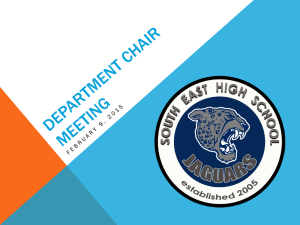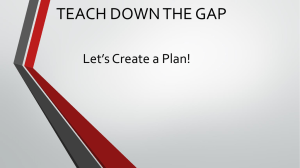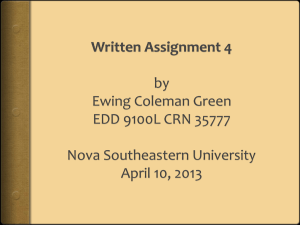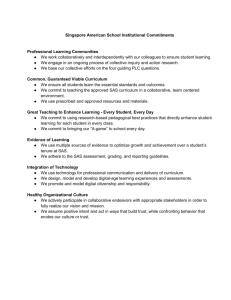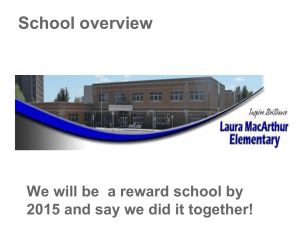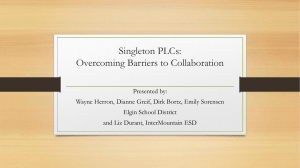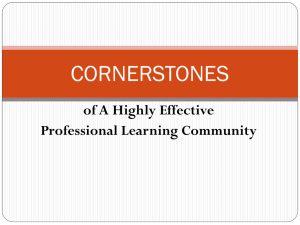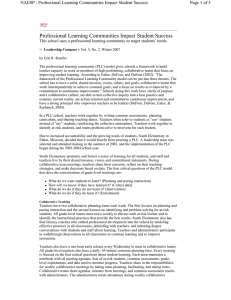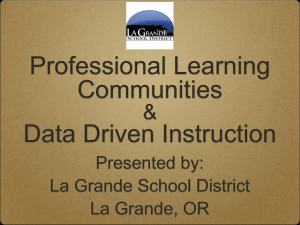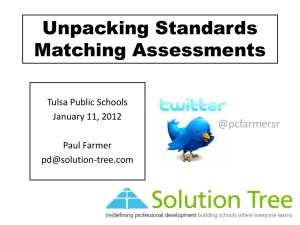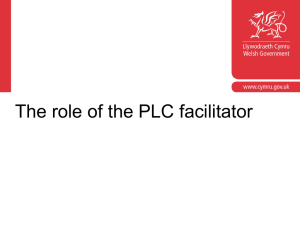On Common Ground - Parkrose School District
advertisement
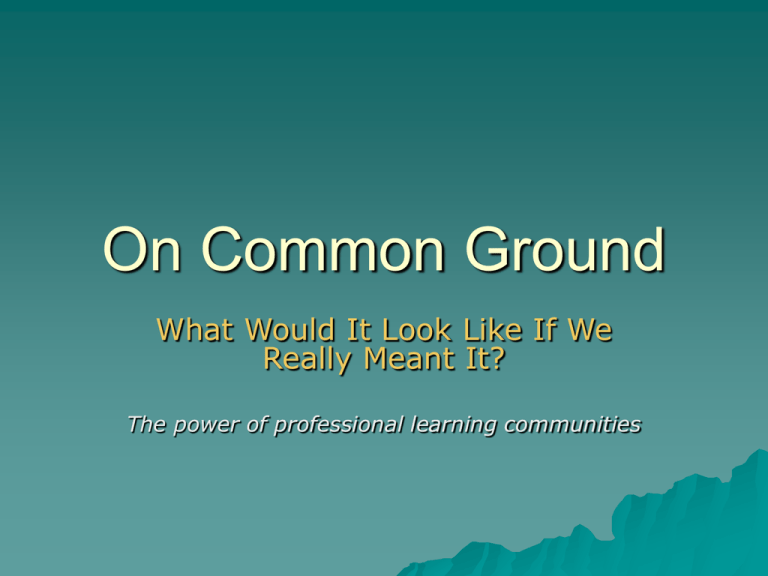
On Common Ground What Would It Look Like If We Really Meant It? The power of professional learning communities Learning Targets Further develop a common understanding of PLCs in the Parkrose S.D. Understand district PLC standards Practice scoring PLC Meeting Notes Team self-score on Collaboration and Data Analysis rubrics Draft PLC plans for three months Agenda PowerPoint Review Handbook Practice using PLC rubrics Plan next three months What Is Our Goal With PLCs? Not just to become a PLC Our goal should be to improve student learning A PLC is a way of thinking Professional Learning Communities A Way of Thinking One of the reasons the PLC concept resonates is because it provides a: – Simple framework for connecting best practices – Common-sense vocabulary – Way of thinking about improving student learning The Power of Caring in Culturally Responsive Teaching …teachers who really care about students honor their humanity, hold them in high esteem, expect high performance from them, and use strategies to fulfill their expectations. ~Geneva Gay Why Does Our Organization Exist In The First Place? A synthesis of effective school leadership concluded that a key leadership responsibility was creating a “powerful community” that was clear on its purpose and goals. ~Marzano, et al. The Three “Big Ideas” of PLC 1. 2. 3. Fundamental shift from a focus on teaching (making sure the content was taught) to a focus on learning. A collaborative culture that utilizes the power of collaborative teams. An intense and passionate focus on results Reciprocal Accountability "Accountability must be a reciprocal process. For every increment of performance I demand from you, I have an equal responsibility to provide you with the capacity to meet that expectation. Likewise, for every investment you make in my skill and knowledge, I have a reciprocal responsibility to demonstrate some new increment in performance." ~Richard Elmore The First “Big Idea” A Focus on Learning A focus on learning represents a fundamental shift in the teacherstudent relationship Does not allow: “I taught it – they just didn’t learn it” Richard Elmore "You don't change performance without changing the instructional core," "The relationship of the teacher and the student in the presence of content must be at the center of efforts to improve performance." What would a focus on learning look like in schools if we really meant it? What is the Obvious Question? First we have to address “learn what?” The Research Says… Teachers are the most effective in helping all students learn when they are clear regarding exactly what their students must know and be able to do, as a result of the course, grade level, or unit of instruction – DuFour, DuFour, Eaker, & Many If We Really Meant It…. Wouldn’t we collaboratively develop: • Power Standards • Pacing Guides • Instructional Framework • A common language of instruction On Common Ground: A Guaranteed and Viable Curriculum The idea that schools should ensure students have access to a guaranteed and viable curriculum (no matter who the teachers is) supported by researchers like: Marzano, Reeves, and Hattie How will we know what students are learning? On Common Ground Common Formative Assessments Using collaboratively developed, common formative assessments to monitor and improve student learning is one of the most widely supported strategies for improving student achievement. So if we really meant it… Wouldn’t we… Have teacher teams collaboratively develop common formative assessments that are designed to monitor the learning if individual students on a timely basis: – kid-by-kid, skill-by-skill? How will We Respond When Some Students Don’t Learn? This is a critical question for schools that “really mean it” when they declare a mission of ensuring high levels of learning for all students. It is disingenuous for any school to claim its purpose is to help all students learn at high levels and then fail to create a system of intervention to give struggling learners additional time and support – DuFour, DuFour, Eaker & Many So, If We Really Meant it… Wouldn’t we… Develop a school-wide systemic plan to provide students with additional time and support or enrichment within the school day regardless of the teacher to whom they are assigned? Change our instructional strategies when what we tried did not get us the results we wanted? The Second “Big Idea” The Power of Collaborative Teams The “Right” Work: – Collaborative developing and using team norms – Clarifying and aligning “essential” learning – Developing common pacing guides – Determining what a standard, if met, would look like in student work. – Develop common scoring rubrics – Collaboratively developing and using common formative assessments The “Right” Work: – Collaboratively analyzing student work and student learning data – Collaboratively developing specific interventions and enrichment strategies for individual students – Monitor and reflect on the results and effectiveness of instructional strategies – Collaborating reflecting on the effectiveness of the team. The Third “Big Idea” A Focus on Results In a PLC, collaborative teams of teachers are using data to inform them of student learning levels Teams set SMARTe goals as a result of their analysis of learning data They publically share and celebrate the improvements. They Develop a “Stop Doing” List What practices may actually hindering student success? Our filter should be: – “How does this practice improve student learning?” Examples: – – – – – The thoughtless use of zeros Not requiring students to do make-up work The inappropriate use of worksheets The inappropriate use of homework Too much weight given to student’s “first attempts” A Focus on Pedagogy A PLC is a group of people sharing and critically interrogating their practice in an ongoing, reflective, collaborative, inclusive, learningoriented, growth promoting way – Mitchell & Sackney, 2000 Final Points: What is non-negotiable? Focus on increasing student achievement Continuously improve the pedagogical skill of our educators – Examine the impact of instruction on student learning – Are we effective?

